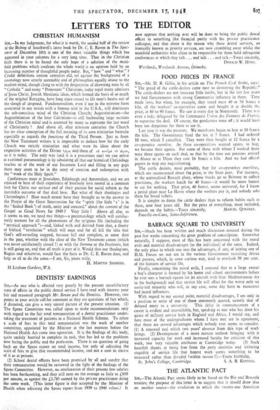BARRACK SQUARE TO UNIVERSITY
Sta,—Much has been written and much discussion aroused during the past few weeks concerning the great problem of conscription. Somewhat naturally, I suppose, most of this has been concerned with the moral evils and material disadvantages (to the individual) of the same. Indeed, the only place in which one sees the advantages, if any, of joining one of H.M. Forces set out are in the various Government recruiting drives and posters, which, in some curious way, tend to overlook 99 per cent. of the features of service life.
Firstly, concerning the moral evils, I contend that to a large extent a boy's character is formed by his home and school environments before he ever sees a barrack square (or jet aircraft with blue. Mediterranean sky in the background) and that service life will affect for the worse only an easily-led minority who will, in any case, some day have to encounter bad moral influences.
With regard to my second point, material disadvantages, I am only in a position to write of one of those commonly quoted, namely that of
delayed entry to a university. This delay in commencement of a career is evident and unavoidable, but, speaking as one who has done his quota of military service both in England and Africa, I would say, and here most of the undergraduates whom I have met are in agreement, that there are several advantages which nobody ever seems to consider. (1) A renewed zeal which two years' absence from this type of work brings. (2) Development of a more mature outlook bringing with it increased capacity for work and increased faculty for criticism of this work, two very valuable attributes at Cambridge today. (3) Such heartfelt thanks at being free from the petty anxieties and irritating stupidity of service life that honest work seems something to be treasured rather than dreaded (within reason l).—Yours faithfully,


































 Previous page
Previous page